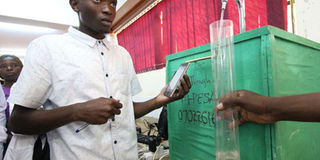Innovation is best way to grow economy

Meru University of Science and Technology Computer Science fourth year student Phenias Njeru explains how the smart fluid dispenser works on September 15, 2017. PHOTO | PHOEBE OKALL | NATION MEDIA GROUP
What you need to know:
As the global business trends move away from brick and mortar stores, poverty reduction and youth empowerment milestones can be achieved by harnessing e-commerce platforms.
Kenya is a global leader in mobile money transfer technologies.
We are on the verge of the fourth industrial revolution. All the earlier industrial revolutions were based on commodities, be it water, steam or electronics.
However, industrial revolution 4.0 is a different ball game. It is a digital revolution anchored on decommoditisation of economies.
Due to its disruptive nature, this is not an extension of the information technology revolution. It is an ecosystem where the world’s largest taxi company does not own a single car but just an app, and drones guided by artificial intelligence are used for parcel deliveries.
It is a knowledge-based economy which puts a premium on the skills of the innovators and the owners of capital. For Kenya to reap maximum benefit, our education system needs a complete overhaul.
It is estimated that 35 per cent of the current professions will be gone by 2035, either because humans will be replaced by machines, algorithms and robots or their skills will no longer be required.
CLASS INEQUALITIES
This will exacerbate class inequalities as the economic gap between the digitally skilled and the unskilled widens, which is bad for prosperity.
More emphasis on Science, Technology, Engineering and Mathematics (STEM) education will be a bulwark against digital disruption as it will bridge the skills demand and supply gap in the labour market. Emerging fields such as big data analytics, artificial intelligence, robotics, internet of things, virtual/mixed reality and genome editing are all STEM-based.
While the 20th century was a commodity century, particularly oil, in the 21st century, data is the new oil. It is not a coincidence that the world’s five most valuable companies — Alphabet (Google’s parent company), Amazon, Apple, Facebook and Microsoft — all have data as one of their core businesses.
Quality STEM education will not only make Kenya ready for changing the work environment caused by changes in skills required but will also be instrumental in addressing the sustainability issues of poverty reduction, quality and affordable education, clean water and affordable sanitation, climate change mitigation and resilient communities.
POVERTY REDUCTION
As the global business trends move away from brick and mortar stores, poverty reduction and youth empowerment milestones can be achieved by harnessing e-commerce platforms. Global e-commerce giants such as Alibaba and Amazon are able to stay on top by leveraging on a massive global digital presence.
For long entrepreneurs and innovators have faced physical infrastructure as a high barrier to market entry. With the digital economy, this wall has been brought down.
Affordable, reliable and clean energy is critical. Currently a significant proportion of the country is not connected to the national power grid. Technologies such as smart grid, solar/thermal energy conversion and advanced battery technologies are an opportunity to improve energy security, cut fossil fuel consumption and reduce the carbon food print.
Kenya is a global leader in mobile money transfer technologies. Kenya scores low in indicators of effective science, technology and innovation policies such as patents, peer-reviewed publications, expenditure on higher education and per capita ratio of researchers. Though university enrolment has soared in the last decade, the percentage of scientists and engineers has not increased proportionally. Kenya is primarily an agricultural economy. However, reliance on rain-fed agriculture has led to unprecedented food insecurity. More populous and desert countries have realised food sufficiency through irrigation, drought resistant strains, and breeding technologies.
A young, vibrant and an innovative population is an asset for prosperity and Kenya is fortunate to have these. Right science, technology an innovation policies are imperative for Kenya to realise Vision 2030.
Dr. Arero is a Science Technology and Innovation Policy Expert




